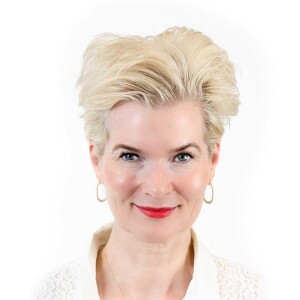Episodes

Thursday Jan 26, 2023
Lanaya Irvin: Who Benefits from DEI?
Thursday Jan 26, 2023
Thursday Jan 26, 2023
Every year companies spend about $8 billion on DEI initiatives in the United States, according to research conducted by the consulting firm McKinsey.
With all this money and attention given to DEI efforts we need to ask ourselves an important question: Who benefits?
A 2019 report entitled Being Black in Corporate America: An Intersectional Exploration released by the consulting firm Coqual, finds that black professionals are more likely to encounter prejudice and microaggressions than any other racial or ethnic group.
They are less likely than their white counterparts to have access to senior leaders and to have support from their managers.
Yet few white professionals see what their black colleagues are up against. 65% of black professionals say that black employees have to work harder in order to advance, but only 16% of their white colleagues agree with that statement.
The study also finds that black professionals are more likely than white professionals to be ambitious, and they are more likely to have strong professional networks.
In this episode, Lanaya Irvin, CEO at Coqual, explains Coqual’s report findings in more detail.
Coqual recently launched a study around black talent in the UK. We saw a similar perception gap. There's this material gap in perception that makes overcoming this, these hurdles of retention, development, advancement that much more difficult. This happens because the gap between what employees are experiencing and what their peers or their managers understand or believe, is really wide.
The starting point is recognizing that we must account for all areas of difference and different lived experiences in understanding inequality and addressing the issues it creates.
Here Lanaya shares with us three actions we can all use in bridging this gap:
Action One: Lift up the ideas of others in order to foster a sense of belonging.
Action Two: Have clear expectations around how you can advance or gain promotions at work.
Action Three: Embrace all differences of those around you whether it be a person’s skillset, their unique contributions to work or their challenges.
Lanaya Irvin
Coqual

Thursday Jan 19, 2023
Emma Codd: While We Love Hybrid Working, We Can’t Ignore The Costs
Thursday Jan 19, 2023
Thursday Jan 19, 2023
Research is telling us is that hybrid working is something most employees want, it does increase our productivity because we don’t have to commute, and most companies are likely to keep it in place, but it comes at a cost.
We need to be aware of these costs so we can manage them. Hybrid working does increase stress, loneliness, isolation, and disengagement. In many ways it is culture eroding. That doesn’t mean we get rid of hybrid working. I believe it is here to stay. Rather it means we need to be aware of these challenges so we can take action to solve them.
The consulting firm Deloitte has for the second year released its Women @ Work 2022: A Global Outlook report, a survey of 5,000 women across 10 countries The survey provides a unique glimpse into the lives of women in the workplace amid the COVID-19 pandemic. The responses from around the globe made it clear that women’s “everyday” workplace experiences were having a detrimental impact on their engagement and that the pandemic was having a severe impact on women’s lives and careers, including their work/life balance and wellbeing.
Emma Codd, Global Inclusion Leader for Deloitte joins me on the podcast today to discuss the report’s findings in more detail. We discuss the issues women face with hybrid working, flexible working and overcoming the barriers to their advancement at work.
Emma states that women that work in a hybrid manner which was around half of the respondents that can work in a hybrid way, of those respondents, 60% said they'd experienced exclusion in the past year. Around 50% said they weren't getting the access they needed to leaders which we all know how important sponsorship is for anybody that is in an underrepresented group is so important. Suddenly that's not there anymore.
Emma states there are four questions every organization globally should be asking; often only needing tweaks to resolve the outcome, but still action taking place:
Question One: Does your culture allow employees to feel safe when asking for flexible working? If not, how can it change?
Question Two: Do all employees feel connected? If not, why not?
Question Three: Do all employees belong? Why do employees feel isolated?
Question Four: Does each employee have equal access to support? How can this access improve?
Deloitte Women @ Work 2022 Survey
Emma Codd

Wednesday Jan 11, 2023
Sarah Wittman: Why Changing Jobs, Changes How You See Yourself
Wednesday Jan 11, 2023
Wednesday Jan 11, 2023
Making a career change is important because outside of sleep, work is where we spend the greatest number of hours over our lifetime. Work plays a huge role in shaping our identities, relationships and sense of belonging.
On today’s podcast we are joined by Sarah Wittman, Assistant Professor of Management at George Mason University’s School of Business, who has conducted research into how work shapes our identity. In her article for Harvard Business Review she shares how thanks to major shifts in the labor market, workers are switching organizations, functions, and even industries much more frequently than past generations. Consequently, our sense of self at work is constantly changing too.
We do tend to be on these career treadmills. What can I get? What's the next position? All of these other things. And even when we're jumping industries, we say, okay, this is a great opportunity for me. I'm going to be increasing maybe my status, my pay etc, maybe my work life balance. But when we really get down to it, I think we need to take into account that identity long angle. Identities, if we want to define them, are these self-definitions; what we use to describe ourselves. This can be personal characteristics, such as, I'm hardworking. Or it can be role related. I am a professor or relational. I'm also a spouse, I'm a teacher, I'm a mentor. Or when we talk about the gender angle, it can be social identities. When we think about what comes with us, and this is where lingering identities come in, it's essentially what do we carry with us when we leave one job and enter another?
Managing our work identity is important, especially when you are looking to change jobs or careers.
In addition to using the VME (Value, Meanings and Enactment) framework, Sarah says there are three actions you can take to ensure your success in a new role, company or career path:
Action One: Understand your current work identity well enough to use it as a filtering device for available opportunities.
Action Two: Only pursue job opportunities that offer a good enough match for your identity.
Action Three: Understand how your identity will change in your new role.
Changing careers or jobs can be difficult. To give yourself the best possible chance of success you have to assess if the job will add and enable your sense of self.
Sarah Wittman
George Mason University

Wednesday Dec 07, 2022
Dr Michelle Harrison – Why Progress For Women Leaders Has Stalled
Wednesday Dec 07, 2022
Wednesday Dec 07, 2022
Successful women often disregard gender roles, which makes people uncomfortable. For female leaders, managing this is critical. Having people support you determines how well you can build relationships and influence people, in other words, how well you can lead. Leading through backlash can be an incredibly difficult thing to do, as it takes a toll on women’s self-esteem and relationships. Backlash results in people disliking successful women and preferring male leaders. As society doesn’t associate women with power, employees don’t either, which is why it’s acceptable to push back on women leaders and question their legitimacy.
On today’s podcast we are joined again by Dr Michelle Harrison Global CEO of Kantar Public, who is going to be discussing the recently published findings of the fifth and extended edition of The Reykjavík Index for Leadership, which highlights entrenched prejudice towards women leaders. Launched in 2018, The Reykjavík Index for Leadership measures and tracks progress in society’s perceptions of women and men’s suitability to lead across 23 economic sectors. Together with Women Political Leaders, Michelle and her company conducted this groundbreaking research, and together we will unpack why societal attitudes have stalled when it comes to women in leadership positions.
If we take the five year view, there's been no improvement, but there was a period when things looked like they were, and then there's been a quite a sharp reversal. Let’s think about those two particular measures. We ask people, and it's a percentage, do they feel very comfortable with the idea of a female CEO of a large corporation. And we also asked the same question about a Head of State. The data on female CEOs for the G7 group go back five years and it was 46% of the population who felt very comfortable. So the majority of people, in the G7 group of countries are not feeling entirely comfortable with the idea of a woman being in charge of a country or a large organization.
To create workplaces that work for everyone we need to understand how they are broken. Here Michele shares specific actions we can take to tackle gender inequality:
Action One: Keep striving for change: we do need to just keep going. We have to create workplaces where people are rewarded fairly and with as much inclusivity as possible, this will benefit us all.
Action Two: Stop trying to fix women, we don't need to fix women. The issues are about the way organizations, companies, and societies work. All of our work about inclusivity and diversity is for everyone and moving sharply away from the idea that we're trying to help women deal with these issues.
Action Three: Keep calling people out. We all need to take a stronger view about all of the actions, behaviors and microaggressions that women and other groups experience every day in the workplace. We need to put the onus on correcting the people who do these things and not on the people who previously we might have been training to better manage being on the receiving end of that.
Dr Michelle Harrison
Kantar Public

Thursday Dec 01, 2022
Thursday Dec 01, 2022
Our expectations of leadership are masculine, when we evaluate men’s potential, we are much more likely to see them as a good fit. Women do not meet our masculine expectations, therefore the projection is never triggered.
This male bias in our cognitive processing of leadership potential is powerful. “Think manager, think male” means we can fail to see women’s leadership potential. In fact, research suggests that men and women behave very similarly in senior roles, but men routinely receive higher leadership ratings.
On today’s podcast, Lisa S. Kaplowitz, Executive Director at Rutgers Center for Women in Business will be joining us to discuss the harmful ways women have to change themselves to fit the ideal worker image, and organizations that devalue anyone who differs from it. In an article for Harvard Business Review entitled, 5 Harmful Ways Women Feel They Must Adapt in Corporate America Lisa and two co-authors share findings from their research, Lisa outlines what these adaptations are and why they are ultimately harmful.
She also leaves us with some actions to implement into our workplaces in order to bridge the gap in the devaluing of difference:
Action One: Be aware – Know what an ideal worker looks like when they show up in your workplace.
Action Two: Ask – Do not assume. Ask an employee how you can support them, what additional resources they might need and what help they may need to advance in their career or to get a project to completion.
Action Three: Ensure interactions are authentic, genuine and informal conversations.
Action Four: Give feedback. Honest feedback, without sugar coating. Allow feedback to be a conversation where all can have their say.
Rutgers Center for Women in Business
Lisa S Kaplowitz

Thursday Nov 24, 2022
Dorie Clark – How To Change Your Career And Find Meaning At Work
Thursday Nov 24, 2022
Thursday Nov 24, 2022
Today is a special episode, we are going to unpack how to make a career change. Whether that is starting a new job or building your own business, at some point most of us will want to make a change, the problem is it can often feel overwhelming when you do. However, you might be surprised to learn just how many of us experience career changes on a regular basis.
According to the latest findings from the Pew Research Center approximately 53% of employed U.S. adults quit their jobs in 2021 and changed their occupation or field of work at some point last year. Additionally, Research by the online career platform, Zippia finds that in the United States, 37% of the labor force changed or lost their job in 2020.
The average American worker has 12 jobs throughout a lifetime and an average tenure of about 4.1 years. Learning to manage your career is a critical skill.
On today’s podcast, Dorie Clark, author, consultant and keynote speaker will be joining us to discuss how you can make a career change and find meaning at work.
While most of us can identify a meaningful goal we want to pursue, there isn’t always an equal opportunity to realize these ambitions. Men and women do not have the same access to purse their passions, hobbies and interests outside of work. In the United Kingdom the office for National Statistics data has found that men spend an average of four hours and 39 minutes every week on hobbies, computing and games. In comparison, women spend just two hours and 38 minutes on the same activities. Men were found to spend more of their hours on leisure time than women in almost every category, including watching TV, hobbies and eating out.
When not in leisure, women were more likely to be performing unpaid work. This may include dependent care and housework.
In order to reach a point of fulfilment Dorie leaves us with some actions from the podcast.
Action 1: Avoid burnout – Get to know yourself, understand how your body feels, don’t get to the point of burnout as the recovery is long.
Action 2: Don’t fight reality – Push yourself when necessary but know when to stop, this is not sustainable.
Action 3: Take the survey – If you answered no to at least half of these questions, you may not feel as engaged or fulfilled in your current role. Something may need to change.
Dorie Clark
Dorie Clark - LinkedIn

Wednesday Oct 26, 2022
Lily Zheng: The Three Reasons DEI Efforts Fail – Fatigue, Backlash and Denial
Wednesday Oct 26, 2022
Wednesday Oct 26, 2022
Joining us on today’s episode is Lily Zheng author of DEI Deconstructed and a sought-after diversity, equity, and inclusion speaker, strategist, and organizational consultant who specializes in hands-on systemic change to turn positive DEI intentions into positive DEI outcomes for workplaces and everyone in them.
Why do DEI efforts fail, is a question asked by many leaders. Why is it that companies claim to be invested in advancing DEI, launching one initiative after another, yet research finds at any one point in time roughly 50% of us feel isolated, excluded, devalued and disengaged at work?
There are three reasons why DEI efforts fail, these include fatigue, backlash and denial. When DEI efforts, don’t address the root cause of inequality people become tired with all the lip service. This fatigue leads to backlash as people resist effort and initiatives that aim to address discrimination and inequality at work. And when resistance isn’t enough, people may resort to denying that inequality exists at all, examples of this include managers simply not believing inequality is a problem in their workplace.
Lily explains that it’s not that people are tired of doing DEI work, it's that they're tired of doing DEI work that doesn't achieve anything. To address that kind of fatigue we need to be rethinking all of our in initiatives, potentially even doing less, but making sure that we can directly tie every single thing we're doing into the outcomes we're trying to create.
Fatigue backlash and denial create the DEI death spiral because it leaves people feeling powerless to affect change. There is nothing I can do to change my workplace, but this simply isn’t true Lily gives us these actions to take away.
Action One: Get to know the difference between the types of power; formal, reward, coercive and expert power. Know that everyone within an organization has power, you just have to know how to use it.
Action Two: Be strategic in how you use your power and think of your connections within an organization to use your unique power as a tool to make change. Back this up with expert ideas to aid change to take place.
Action Three: Organizing is really powerful. You can organize as part of an employee resource group. You can organize as part of a DEI council or committee, you can organize to encourage and highlight the workforces strengths. All of these are really powerful. Manifestations of collective power, collective organizing, collective advocacy. They’re all tools that all employees have at their disposal to make change within workplaces
Lily Zheng
Dei Deconstructed: Your No-Nonsense Guide to Doing the Work and Doing It Right

Wednesday Oct 19, 2022
Colleen Ammerman: 3 Workplace Biases That Derail Midcareer Women
Wednesday Oct 19, 2022
Wednesday Oct 19, 2022
In today’s episode of The Fix, we are going to unpack the specific challenges that women face at the midpoint in their careers, with Coleen Ammerman, the director of the 'Gender Initiative' at Harvard Business School and coauthor, with Boris Groysberg, of 'Glass Half-Broken: Shattering the Barriers That Still Hold Women Back at Work'. Colleen shares why the barriers to women’s advancement at work are greatest around the midpoint in their careers.
Inequality is particularly challenging for women managers because of the continued acceptance and denial of negative gender norms at work. For example, according to one study outlined in Michelle’s book, 'The FIX: How to Overcome the Invisible Barriers That Are Holding Women Back at Work', about 82% of the 350 male CEOs surveyed agree that the key barrier women face at work is a lack of general or supervisory experience. However, only 47% of the 461 female leaders surveyed agree that this is a key barrier.
This difference comes down to the widely held belief, established through the patriarchy and that women are simply less capable than men. This shows up when men say things like “She needs more time to round out her experience” or even “She needs more time to prove herself”, about women who are just as experienced as their male colleagues. Experience is not the issue here. Women must overcome the widespread belief that they are just not as competent as men. Colleen explains the scrutiny women encounter at the midpoint in their careers when it comes to performance.
During our discussion, Colleen shares with us some key actions she believes we need to take to remove the barriers women face at work.
Action One: Acknowledge that inequality is a workplace issue. We need to fix the processes and systems that create inequality by removing the biases in how companies hire, develop, reward and promote women.
Action Two: We need managers to be committed to being objective and making decisions which both recognize and remove their own biases. This starts with leaders becoming aware of how their beliefs about competence and leadership could negatively impact the judgments they make about women at work.
Action Three: You have the power to advocate for yourself and your colleagues. When decisions are made in your workplace about women or minorities that limits them or their advancement, always ask why. Why is this requirement used for promotion decisions? Why are we not asking the same of men? Why do women need to do more to be considered for a promotion? Why can’t mothers lead? Why are there so few women leaders in our organization? If you are ever unsure about whether to ask why or whether the situation is an example of an invisible barrier, consider if the situation is something a man is likely to experience. Would men’s promotability be limited if they got married? Is a man’s leadership capability questioned when he becomes a father? If the answer is no, then push back. Keep asking why until the real problem surfaces.
Colleen Ammerman
Glass Half-Broken: Shattering the Barriers That Still Hold Women Back at Work.


